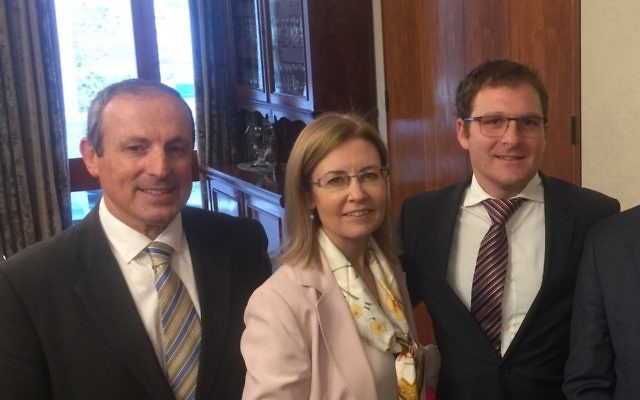‘A historic reform’
NSW Attorney-General Gabrielle Upton has publicly admitted for the first time that Section 20D of the NSW Anti-Discrimination Act is not working and she will introduce legislation by May to fix it.
NSW Attorney-General Gabrielle Upton has publicly admitted for the first time that Section 20D of the NSW Anti-Discrimination Act is not working and she will introduce legislation by May to fix it.
It comes in the wake of the decision by the NSW Police not to take legal action against Hizb ut-Tahrir spiritual leader Ismail al-Wahwah, who last year described Jews as “the most evil creature of Allah” in a public speech and threatened that “the ember of jihad against the Jews will continue to burn … an eye for an eye, blood for blood, destruction for destruction”.
Section 20D covers the criminal offence of serious racial vilification.
“No-one has been successfully prosecuted under Section 20D since it was inserted in the Act in 1989,” Upton said at the NSW Jewish Board of Deputies’ (JBOD) plenum on Tuesday night.
“It’s clear the Act is not working as intended. It must be changed to meet its objectives … to protect our community from hate speech, to better protect our community from violence or from threats of violence, to secure that inclusive, tolerant, harmonious community of which we are very proud.”
Upton confirmed that the government would implement most of the recommendations of previous reports, which called for procedural changes to the Act, including repealing the requirement for an Attorney-General to consent to prosecutions under Section 20D; extending the time limit for commencing prosecutions; and allowing the president of the Anti-Discrimination Board to directly move serious complaints of racial vilification to the police.
And she committed to going further as well. “Changes above and beyond the report’s recommendations are necessary, and will take place,” she said. “We cannot let race hate speech divide the community that is priding itself in diversity. By singling any particular group out in our community in a racist way, we are all targeted.
“Words can be weapons for race hate preachers, violent extremists and their recruiters. Words can poison the minds of at-risk, marginalised youth.”
Upton said it is “vital that we get any changes to the law right from the outset”, and that the government would undertake “extensive consultation” prior to releasing an exposure bill in January.
“We will also invite the community to comment on whether further changes to the law … are necessary,” Upton said. “It is very important that we have broad consultation on what the changes may be.”
Anti-Discrimination Board of NSW president Stepan Kerkyasharian told The AJN: “We are heartened by the government’s decision to review the legislation, especially in the current environment where community harmony is strained and where simple words can have serious negative consequences in the community.”
He also welcomed the decision to have consultations with the community “because it is important to have the community on side in such matters and the consultation process itself will have educational benefits”.
JBOD president Jeremy Spinak said his organisation is “very pleased that reform of Section 20D of the NSW Anti-Discrimination Act is on the government’s agenda”.
“There is an important need to legislate and educate effectively against incitement to racist violence, racial harassment and intentional promotion of racial hatred,” Spinak said.
“We look forward to participating in any public consultation and commenting on any exposure draft when it is released.”
EVAN ZLATKIS


comments